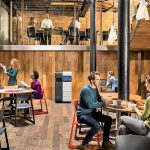Nestlé – a pioneer in flexwork in Portugal
A report published this year by Polar Insight revealed that of all the countries in the European Union, Portugal is seriously lagging behind today’s flexwork practices. One multinational, Nestlé, however, is very much in the forefront when it comes to flexible working.
Nestlé has been in Portugal for almost 100 years. Despite being a multinational, many Portuguese think it is a Portuguese company.
Fifty percent of its business in Portugal is coffee with household name brands like Nespresso and Dolce Gusto.
“We have several Portuguese iconic brands which belong to Nestlé, like Nestum, Cerelac and Pensal but that fact is that we are a multinational company” says Nestlé Human Resources Director Maria do Rosário Vilhena.
At Nestlé they have been focusing on business strategy going forward, even though the company’s sales have been successfully growing and grew during the economic crisis. It is still Nº1 in the market but they understood the market is changing and realised Nestlé was not changing to keep pace.
“We realised that if we wanted to continue being successful in the coming years, we really needed to anticipate the change” says Vilhena.
“We understood the market was developing new trends, natural biological and gluten-free products that were supported by government legislation in terms of sugar, salt and fat content restrictions. People’s lifestyles are changing; they want healthier lifestyles and a good work-life balance. Today’s concept is all about wellness and wellbeing” she explains.
Nestlé competes with small players in its market but that does not mean it can rest on its laurels.
“We are competing in all areas, not just products, but also for talent, because what people looked for in a career at the time of Salazar or even post-Revolution was stability; a lifelong job, and even today we still have people who have been with us for 40 years” the HR director says.
A changing mindset
That model and mindset is radically changing. Vilhena says that today people don’t want jobs; they want experiences. It is no longer about a career path, but rather what experiences they will have that will bring them diversity, growth, development, motivation, and doing different things that fulfil them as employees and enable them to explore different sides of their personality.
“When you talk to a Millennial about a career path, it is very difficult for them to conceive committing to one path. They want to try different things, decide what they like and are good at, and even take a sabbatical to do something else” she explains.
Vilhena says this new attitude surprisingly works for Nestlé which believes that such an attitude helps people to grow. “The important thing is that if they do leave, they will miss us and want to come back and we have the door open for them” she says.
For young graduates, Nestlé Portugal offers two approaches: internships, where they work in a specific area and within that area can explore its different sides; and the Young Graduates Programme which is called Born to Talent where the graduate is with Nestlé for one year and explores different company areas. That way they understand the business.
Nestlé then developed the concept of being an anticipative organisation — an organisation that sets the trend, where employees are given the tools, develop the mindset and the knowledge to drive change rather than react to it.
“We need people who understand analytics and big data and have the right mindset which means being courageous and not afraid to fail. The important thing is that you fail, you must recover immediately and learn from the failure” Vilhena stresses.
Nestlé wants people that are leaders, which does not mean line managers. It means people who know what they are doing on a project, they drive it and they lead the team and engage with it throughout the vision. And for that the company understands that it needs to enable and empower them. If not, they will never take initiative and be accountable.
“One of the things we do is the 24 Hour Leadership Challenge involving a group of young talent and we put them in a crisis situation for 18 hours in a row without sleep”.
It sounds like something out of a TV reality show. But Vilhena laughs and plays down the suggestion.
“The challenge has actually worked extremely well, because the crisis situation has proved an enabler to encourage the right behaviours and consequent reflection on how they behaved” she explains.
Flexibility at work
Flexibility in the workplace is for Nestlé an enabler and the result of the company mindset. “If I want a company that is flexible, agile and capable of anticipating trends, where people make coalitions naturally and work together, then we need to have a workspace that facilitates that” she points out.
“Our workplace should reflect the company culture and for Nestlé that means we should have open spaces; there shouldn’t be any offices anymore. In the future managers will sit with their teams. Employees should have the flexibility to work wherever they want, but also have different spaces inside the building for different things. If you need to reflect we have a silent room where you can think about what you’re doing. There are brainstorming rooms with whiteboards as well as fun and relaxation spaces” Vilhena continues.
At Nestlé they have objectives. They delegate from the top and have discussions on how staff can contribute towards the objectives they are set. The rules are set and each know how they should work, what the guidelines are and who the stakeholders are. How the team works rather than where is key; the important thing is that set objectives are achieved.
“Whether you want to work from the office or from home, or if you are here from 9-5 or it is better for you to work from home and leverage technology to connect with colleagues is ok and we totally allow that” says the HR director.
“The concept here — obviously there are functions when staff have to be in the office from 9-5 such as at Nestlé’s call centre which is an exception — is that you work whenever you want and wherever you want providing you get the job done within the time-frame and you achieve the result in line with our principles and behaviour” Vilhena explains.
Nestlé had actually been operating that system informally for some time but it was more preponderant with some teams which were still very dependent on the line manager. But where the line manager was more flexible, the system was allowed
“Flexwork was formally introduced at the end of 2017 when we removed the need to clock in at set times. We now have total flexwork. All we ask employees is to ensure that they deliver and do so in a balanced way” she says.
This does not mean that Nestlé expects its employees to automatically work very long hours or in a concentrated period of time, or even to take laptops home instead of spending quality time with family and children or practising the sports they like to do.
“Where we see more resistance to this policy is with line managers who sometimes don’t feel confident enough to see that delegating and empowering the team is actually contributing towards their own progression and success as leaders. You don’t need to be in the office to deliver. The fact is that often staff work better when they are at home” Vilhena observes.
Case studies
By way of example, Vilhena gives the case of a staff member whose child had contracted chicken pox but was on a deadline for a project.
“If I had forced her to be in the office she would have been miserable and worried. She would have had to either pay for a nanny to be with the kid or ask her parents to step in” she says.
“It was better for her to stay at home and follow up remotely on progress and any arising issues. If the employee can drop into the office for a meeting or can conduct it via Skype that’s fine. In this case, she stayed at home with the child, completed the project and didn’t take sick leave. The child got better and went back to school and she came in a day earlier than expected. It was a win-win. Everyone was happy” Vilhena recalls.
Another example was an employee whose husband was promoted CEO of a big company in Brazil had to relocate.
“It’s very difficult to find good employer relations managers in Portugal and it would take me time to find a replacement. So, I decided to experiment. I decided she should work remotely from Brazil for six months. It worked perfectly! She was happy, she helped us and solved a lot of problems. It was all done by E-mail, Skye and video conference” she continues.
The fact that you have the theoretical possibility of never coming to an office shouldn’t mean abdicating that proximity that working with colleagues brings. Vilhena says that Nestlé is a very familiar environment where staff make great friends and like to come in to work because it’s fun. People still need that human connection.
Resistance to change
With more traditional companies, the reticence to adopt flexwork is “shocking” in Portugal because Vilhena knows what they are losing by sticking to old working behaviour patterns.
“I also think that people stick to that behaviour and those guidelines because they are not forced to change. If you are in an area or niche where the company has a monopoly and has support from the State or is state-owned, there is no pressure or drive to change” she says.
“What I foresee is that society itself and the younger generation will force that change as new ways of organisation and work patterns are required to capture human potential. If companies are not flexible, they will not get the best talent in the market. HR is, at the end of the day, a business like any other. I need to attract the best talent for the jobs I require at the best price. I need to be competitive” Vilhena argues.
Inflexible labour laws
Unfortunately, Portugal’s labour laws do not support these new ways of working and flexibility.
“When your look at our labour laws, they are still very much fashioned by the post-Revolution period. Our laws are very protective of the worker, which I think is a good thing, but I also believe there are other ways to protect workers without compromising what the younger workforce want” Vilhena explains.
“Today’s working generation is the first to say they don’t want to clock in and clock out or be in an office 9-5. Unfortunately, even if we were to register working periods on laptops, the authorities don’t allow it and call it false flexibility because it is ‘conditioning’ the workforce,” she says critically.
Portuguese law states employees have to clock in and clock out four times a day: on arrival, when going to lunch, when returning from lunch and when leaving the premises.
“The law in Portugal is simply not open to these new ways or working and labour arrangements, so we have to employ clever experts to ensure that we are still compliant with the law, yet the door is still open to a more flexible working method that our staff want” concludes Maria do Rosário Vilhena.
Text: Chris Graeme










